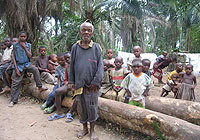Congo forces regain control over several villages in eastern part of country
Government forces retook several villages in eastern Congo under control from rebel fighters loyal to a powerful warlord, and the army claimed more than 100 people had died in four days of fighting in the region.

Troops seized the villages of Karuba, Ngigo and Muremure in troubled North Kivu province from rebel chief Laurent Nkunda's fighters, said Maj. Prem Kumar Tiwari, a regional spokesman for the U.N. peacekeeping force in Congo.
Tiwari said most fighting in the three villages ended late Tuesday and the army re-seized them from Nkunda's forces Wednesday.
Clashes erupted anew in east Congo's North Kivu on Sunday. Speaking over a U.N.-funded radio station, Congo army Col. John Tshibangu said 85 rebel soldiers and 16 government troops had been killed in the last four days. Tshibangu also said 27 soldiers were wounded.
It was not possible to independently confirm the claim, and rebel officials could not be reached for comment.
Chief U.N. peacekeeping spokesman Kemal Saiki said the fighting was making it difficult to distribute food aid to tens of thousands of displaced people, including 30,000 who have fled their homes in the last few days.
News of fighting in multiple locations forced the U.N. World Food Program to delay the departure of its trucks in some areas because "they have to pass by Shasa, where fighting is taking place," Saiki said.
Shasa is also located in North Kivu province, which straddles the borders with Rwanda and Uganda.
On Tuesday, Nkunda promised to launch a counteroffensive against the government to defend his forces after the breakdown of a cease-fire.
A former army general-turned-warlord, Nkunda has been battling government forces on and off since December. The two sides agreed to stop fighting and try to restart talks about a month ago, but new clashes erupted in late September and early October.
Since January, between 400,000 and 500,000 people have been displaced by fighting in Congo's North Kivu province, according to the U.N. Hundreds of thousands more have been displaced in the region for years before that as a result of rampant insecurity in the lawless region.
Nkunda, whose Tutsi ethnic group is a minority in Congo, left the army and formed his own militia soon after Congo's war ended in 2002, claiming he needed to fight to protect Tutsis from Rwandan Hutu rebels who took refuge in east Congo following Rwanda's 1994 genocide.
In 2004, Nkunda briefly captured the city of Bukavu. His troops have been accused of torture and rape, and he is named in an international arrest warrant for alleged war crimes.
Congo's government has struggled - with little success - to establish authority over eastern regions thousands of kilometers (miles) from Kinshasa, the capital.
U.N. peacekeepers helped end the 1998-2002 war in Congo that engulfed six neighboring countries. The nearly 18,000-strong mission in Congo is the United Nations' largest peacekeeping operation.
Subscribe to Pravda.Ru Telegram channel, Facebook, RSS!


